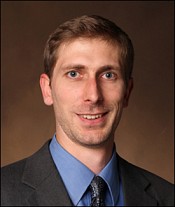Medical Physics Seminar – Monday, May 1, 2017
Cutting through the Fog: Eliminating Clutter in B-Mode and Doppler Ultrasound

Brett Byram, PhD (hosted by Kevin W. Eliceiri)
Assistant Professor of Biomedical Engineering, Vanderbilt School of Engineering, Nashville, TN - USA
Ultrasound has experienced a recent explosion of new advances and techniques, and many of these techniques are already making their way into clinical practice. Ultrasound’s bright future is only mitigated by continued challenges with image quality. Clinical exams commonly result in suboptimal images or fail completely (9-64% failure rates depending on the application and patient population). In my lab, we are developing new strategies to improve image-quality that preserve the inherent nature of B-Mode images and are consistent with the demands of advanced ultrasound methods. The primary method I will discuss is called Aperture Domain Model Image Reconstruction (ADMIRE). ADMIRE produces consistent improvements in image quality, while preserving normal B-Mode statistics. I will connect these improvements to image guidance challenges within interventional radiology. Next, I will describe more recent work in my lab to overcome a decades old problem in ultrasound perfusion imaging. In the past, ultrasound has not been sensitive to slow blood flow at diagnostic frequencies without microbubble contrast agents. I will show how the previous limit can be reduced by an order of magnitude allowing ultrasound to be sensitive to flow in small arterioles, venules, and possibly even capillaries using normal diagnostic imaging frequencies. This method will be broadly useful, but I will describe its utility in interventional radiology as a monitoring tool for transarterial chemoembolization (TACE).
------
Brett Byram received the B.S. degree in biomedical engineering and math from Vanderbilt University, Nashville, TN, in 2004. He received the Ph.D. degree in biomedical engineering from Duke University, Durham, NC, where he then stayed as a research assistant professor. In August 2013, Brett joined the Biomedical Engineering department at Vanderbilt University, Nashville, TN, as an assistant professor. He has spent time working in Jørgen Jensen’s center for Fast Ultrasound, Lyngby, Denmark, and also in Siemens Healthcare’s ultrasound division, Mountain View, CA. He currently runs the Biomedical Elasticity and acoustic Measurement (BEaM) laboratory, where he and others in the lab pursue solutions to clinical problems using ultrasound. His research interests include beamforming, motion estimation, and other related signal processing tasks.